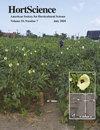不同的冠状病毒法规对绿色产业销售的影响
IF 1.5
3区 农林科学
Q2 HORTICULTURE
引用次数: 0
摘要
2020 年,COVID-19 大流行改变了许多企业的经营方式。值得注意的是,各州实施的法规影响了绿色产业公司销售植物和景观产品的方式。然而,并非所有州都实施了同样严格的法规。利用 2021 年 1 月实施的一项在线消费者调查,我们考察了不同法规严格程度对五个处理组(密歇根州、纽约州以及低、中、高严格程度组)的影响。我们估算了 2020 年与 2019 年自我报告支出之间的差异,并结合倾向得分匹配法对每种处理方法与其他处理方法进行了比较。结果表明,在大多数情况下,与 COVID 法规相关的严格程度较高的州在 2019 年和 2020 年之间不会对植物和景观支出产生负面影响。不过,密歇根州消费者在园林产品方面的支出确实明显低于中等和高严格程度的州。密歇根州是仅有的两个对绿色产业公司进行限制的州之一,也是唯一一个将绿色产业公司列为非必要的州。此外,纽约州的消费者在植物方面的花费高于低限制州,而低限制州的消费者在植物方面的花费低于高限制州。此外,各州处理组之间的在线支出没有差异。从政策角度看,监管类型(即像密歇根州那样关闭绿色产业部门)对绿色产业内不同产品类别的影响各不相同。本文章由计算机程序翻译,如有差异,请以英文原文为准。
Impact of Varying Coronavirus Regulations on Green-industry Sales
In 2020, the COVID-19 pandemic changed the way many businesses conducted business. Notably, regulations imposed by states impacted how green-industry firms sold their plants and landscape products. However, not all states implemented the same stringency of regulations. Using an online consumer survey implemented in Jan 2021, we examine the impact of varying regulation stringencies across five treatment groups (Michigan, and New York, and low, medium, and high stringency). We estimate the difference between 2020 and 2019 self-reported expenditures, in conjunction with propensity score matching to compare each treatment with the other treatments. Results indicate that, for the most part, states with greater stringency associated with their COVID regulations did not impact plant and landscape expenditures negatively between 2019 and 2020. However, Michigan consumers did spend significantly less than medium- and high-stringency states for landscape products. Michigan was one of only two states that put qualifications on green-industry firms, and it was the only state to list green-industry firms as nonessential. Also, New York consumers spent more than low-stringency states, and low-stringency states spent less than high-stringency states for plants. Furthermore, there were no differences in online expenditures between state treatment groups. From a policy perspective, regulation type (i.e., shutting down green-industry sectors as Michigan did) had varying impacts across product categories within the green industry.
求助全文
通过发布文献求助,成功后即可免费获取论文全文。
去求助
来源期刊

Hortscience
农林科学-园艺
CiteScore
3.00
自引率
10.50%
发文量
224
审稿时长
3 months
期刊介绍:
HortScience publishes horticultural information of interest to a broad array of horticulturists. Its goals are to apprise horticultural scientists and others interested in horticulture of scientific and industry developments and of significant research, education, or extension findings or methods.
 求助内容:
求助内容: 应助结果提醒方式:
应助结果提醒方式:


